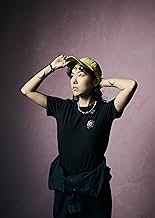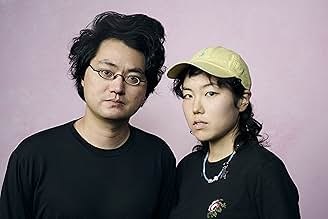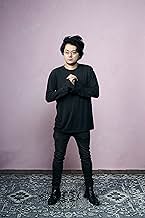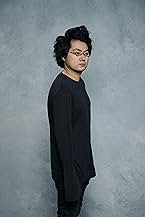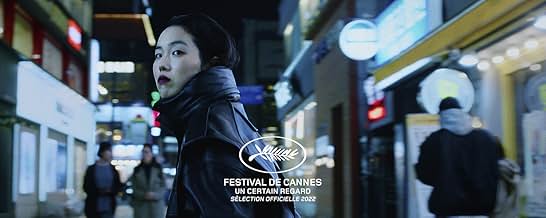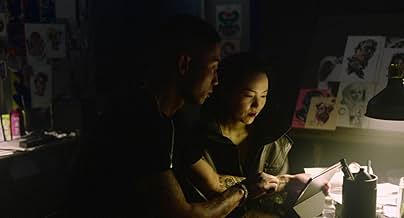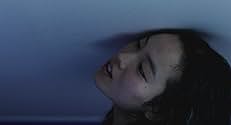VALUTAZIONE IMDb
6,9/10
9983
LA TUA VALUTAZIONE
Una donna francese di venticinque anni torna in Corea, il paese in cui è nata prima di essere adottata da una coppia francese, per la prima volta. Vuole rintracciare i suoi genitori biologic... Leggi tuttoUna donna francese di venticinque anni torna in Corea, il paese in cui è nata prima di essere adottata da una coppia francese, per la prima volta. Vuole rintracciare i suoi genitori biologici, ma il viaggio prende una svolta sorprendente.Una donna francese di venticinque anni torna in Corea, il paese in cui è nata prima di essere adottata da una coppia francese, per la prima volta. Vuole rintracciare i suoi genitori biologici, ma il viaggio prende una svolta sorprendente.
- Premi
- 10 vittorie e 25 candidature totali
Heo Jin
- Grandmother
- (as Jin Heo)
Régine Vial
- Gisèle Benoît
- (as Régine Vial Goldberg)
Shin Dong-ho
- Tena's Father
- (as Dong-ho Shin)
Recensioni in evidenza
What stands out the most about this film is its refusal to take the easy route. While viewers may think they can predict the direction after the first act, they are mistaken. The narrative defies predictability, mirroring the unpredictable nature of wounded souls and those who never feel truly at home.
The protagonist's actions may seem foolish, but what truly captivates is the striking humanity portrayed with raw realism, making it impossible to abandon the desire and hope for her to find solace within. I was left speechless when I found out that this is Ji-Min Park's debut role. A role that made me shed tears on more than one occasion and that is her merit in making us see so well that everything she is, is the result of her life's circumstances.
The experiende Oh Gwan-rok, in the role of the biological father, is also outstanding, but this is not just a film of performances. It boasts brilliant scenes, expertly paced storytelling, daring technical choices, and a secure, risk-taking direction, all complemented by a flawless soundtrack.
PS: The main theme of this and the one of "Decision to Leave" are two haunting melodies that linger in my mind, compelling me to delve deeper into the history of South Korean music.
The protagonist's actions may seem foolish, but what truly captivates is the striking humanity portrayed with raw realism, making it impossible to abandon the desire and hope for her to find solace within. I was left speechless when I found out that this is Ji-Min Park's debut role. A role that made me shed tears on more than one occasion and that is her merit in making us see so well that everything she is, is the result of her life's circumstances.
The experiende Oh Gwan-rok, in the role of the biological father, is also outstanding, but this is not just a film of performances. It boasts brilliant scenes, expertly paced storytelling, daring technical choices, and a secure, risk-taking direction, all complemented by a flawless soundtrack.
PS: The main theme of this and the one of "Decision to Leave" are two haunting melodies that linger in my mind, compelling me to delve deeper into the history of South Korean music.
I could not watch this film without any expectation or prejudice, as I know someone who has a sibling that is an adopted Korean child. However I still tried to keep an open mind, and I think the film is executed well.
Freddie is the only character that is really fleshed out and I think that's right. There are several other characters, notably Freddie's father, that are treated with respect by the film but they are not given a lot of depth. But since it's not their story that is being told they all have to take a back seat to the little girl that it's all about.
After watching this I did a little digging and I found that adoption, foreign or not, is culturally, politically and therefore historically laden in South Korea. You have to want to go looking for it as the film does not push the subject too heavily, but it certainly has several scenes referring to this subject from the institutional rather than the personal viewpoint.
I do think the film has some problems in finding the right tone and there are segments that do not help progress the story. The whole birthday party segment might be nicely shot but does not really add anything.
All in all it's a good film and it triggered me to learning a bit more about its subject matter.
Freddie is the only character that is really fleshed out and I think that's right. There are several other characters, notably Freddie's father, that are treated with respect by the film but they are not given a lot of depth. But since it's not their story that is being told they all have to take a back seat to the little girl that it's all about.
After watching this I did a little digging and I found that adoption, foreign or not, is culturally, politically and therefore historically laden in South Korea. You have to want to go looking for it as the film does not push the subject too heavily, but it certainly has several scenes referring to this subject from the institutional rather than the personal viewpoint.
I do think the film has some problems in finding the right tone and there are segments that do not help progress the story. The whole birthday party segment might be nicely shot but does not really add anything.
All in all it's a good film and it triggered me to learning a bit more about its subject matter.
Return to Seoul is an ambitious film, telling the story of a young woman named Freddie, who was born to Korean parents, but grew up in France. She - you guessed it - returns to Seoul, partly motivated to search for them, in her early to mid-20s. From there, the movie plays out sort of the way you'd expect for a while... until it makes some interesting narrative decisions, spanning far more time than I'd expected it would. As such, we get an insight into Freddie and the ways she changes throughout her 20s and into her early 30s.
Tonally, it's very different from The Worst Person in the World, but I got flashes of that film from this; maybe it scratched a similar itch. Each looks at a troubled & flawed, yet interesting, compelling, and sympathetic young protagonist, each spans quite a long period of time, each explores loneliness and the trials and tribulations of early adulthood in a very hard-hitting way, and each is quite visually striking. But like I said, they're tonally different, given Return to Seoul is more of a straightforward drama than a romantic-dramedy, and it gets darker and more in-depth with its exploration of loneliness (which hits extra hard, given what the world's been through since the start of the 2020s).
It's not always clear where the film is going, and some of the decisions it makes are quite jarring (though most work for the story and characters, once the shock wears off). The pacing is quite slow, but the compelling main character, the visually pleasing look of the film, and the amazing acting kept me engaged for almost all of its two-hour runtime. Park Ji-Min gives one of the best performances of 2022, and I was shocked to read this is her first ever movie. A performance like this that's so central makes or breaks this kind of character-focused film, and thankfully, she's up to the task and then some.
This might not be everyone's cup of tea, but I liked it a lot. While it was deliberately-paced, it never lost me, and I found some of the scenes quite moving. It's a very good movie; hopefully it won't go under too many people's radars, as Awards Season ramps up.
Tonally, it's very different from The Worst Person in the World, but I got flashes of that film from this; maybe it scratched a similar itch. Each looks at a troubled & flawed, yet interesting, compelling, and sympathetic young protagonist, each spans quite a long period of time, each explores loneliness and the trials and tribulations of early adulthood in a very hard-hitting way, and each is quite visually striking. But like I said, they're tonally different, given Return to Seoul is more of a straightforward drama than a romantic-dramedy, and it gets darker and more in-depth with its exploration of loneliness (which hits extra hard, given what the world's been through since the start of the 2020s).
It's not always clear where the film is going, and some of the decisions it makes are quite jarring (though most work for the story and characters, once the shock wears off). The pacing is quite slow, but the compelling main character, the visually pleasing look of the film, and the amazing acting kept me engaged for almost all of its two-hour runtime. Park Ji-Min gives one of the best performances of 2022, and I was shocked to read this is her first ever movie. A performance like this that's so central makes or breaks this kind of character-focused film, and thankfully, she's up to the task and then some.
This might not be everyone's cup of tea, but I liked it a lot. While it was deliberately-paced, it never lost me, and I found some of the scenes quite moving. It's a very good movie; hopefully it won't go under too many people's radars, as Awards Season ramps up.
Return to Seoul: A stranger in a strange land, adopted as a bay from South Korea and raised in France, 25 year old Freddie (Ji-Min Park) returns. It is a bit of a culture shock but she quickly makes friends. She is persuaded to contact her birth parents through the adoption agency and eventually her father responds. All does not go swimmingly especially as Freddie's free spirit clashes with Korean reticence and patriarchal norms. Freddie herself however is self-centred and even cruel to friends and family. The film captures snapshots her life for her first two weeks as an returnee in Korea, two years later, five years after that and finally a year later, eight years since her first return visit. She develops in some ways, degenerates in others. An interesting tale of loss, acceptance, search for identity and longing on the part of Freddie. Directed and written by Davy Chou. 8/10.
The film offers a fresh and nuanced perspective on the complexities of identity, home, and emotional upheaval. The central character's multi-year quest to return to her place of birth serves as an intense focal point for exploring the intricate emotions and challenges related to adoption and self-discovery. However, a minor drawback lies in the occasional reliance on clichés, which briefly detract from the otherwise innovative approach.
The narrative structure stands out for its inventiveness, seamlessly weaving multiple timelines in a way that enriches the emotional landscape. The fragmented narrative is both audacious and purposeful, reflecting the protagonist's evolving inner world.
Beyond visual appeal, the film's cinematography serves as a narrative tool, adding layers of meaning to characters and themes. The score acts as the emotional backbone, elevating key moments and offering another layer to the viewer's experience.
In summary, the film emerges as a deeply affecting and intellectually stimulating exploration of identity, adoption, and the pursuit of true belonging. With its compelling storytelling, captivating performances, and visually arresting cinematography, it provides not just entertainment but a profound cinematic experience.
The narrative structure stands out for its inventiveness, seamlessly weaving multiple timelines in a way that enriches the emotional landscape. The fragmented narrative is both audacious and purposeful, reflecting the protagonist's evolving inner world.
Beyond visual appeal, the film's cinematography serves as a narrative tool, adding layers of meaning to characters and themes. The score acts as the emotional backbone, elevating key moments and offering another layer to the viewer's experience.
In summary, the film emerges as a deeply affecting and intellectually stimulating exploration of identity, adoption, and the pursuit of true belonging. With its compelling storytelling, captivating performances, and visually arresting cinematography, it provides not just entertainment but a profound cinematic experience.
Lo sapevi?
- QuizThe movie is based on the life of Laure Badufle, a friend of director Davy Chou. Like Freddie, she was born in South Korea, stayed a year there before being adopted in France. At age 23, she came back and lived for two years there before returning to France. A few years after that, Chou accompanied her to South Korea, when they met her biological father and grandmother. According to him, the meeting was full of emotions, of regret and bad communication, with the translator struggling to convey Badufle's anger into polite Korean.
- Colonne sonorePetals
Written by Shin Jung-Hyun
Performed by Lee Junh-Hwa
I più visti
Accedi per valutare e creare un elenco di titoli salvati per ottenere consigli personalizzati
- How long is Return to Seoul?Powered by Alexa
Dettagli
- Data di uscita
- Paesi di origine
- Sito ufficiale
- Lingue
- Celebre anche come
- Return to Seoul
- Luoghi delle riprese
- Aziende produttrici
- Vedi altri crediti dell’azienda su IMDbPro
Botteghino
- Budget
- 2.200.000 € (previsto)
- Lordo Stati Uniti e Canada
- 798.774 USD
- Fine settimana di apertura Stati Uniti e Canada
- 27.315 USD
- 19 feb 2023
- Lordo in tutto il mondo
- 2.175.376 USD
- Tempo di esecuzione1 ora 59 minuti
- Colore
- Proporzioni
- 1.85 : 1
Contribuisci a questa pagina
Suggerisci una modifica o aggiungi i contenuti mancanti




